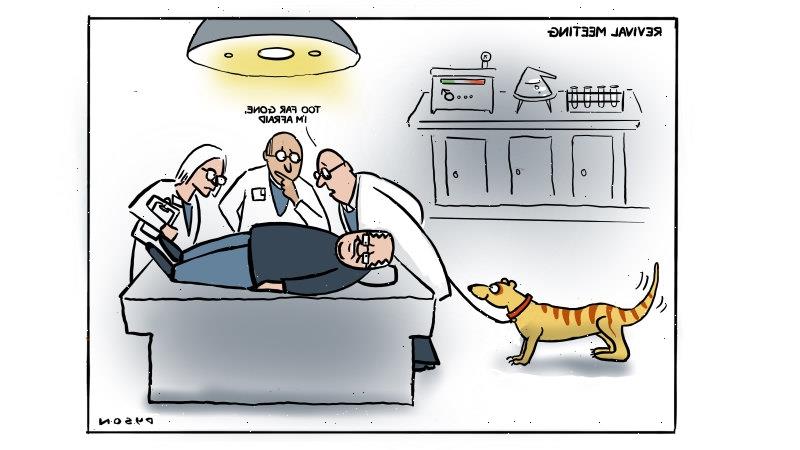
Higher vehicle fuel standards would be a good place to start
August 19, 2022Illustration: Andrew DysonCredit:
To submit a letter to The Age, email [email protected]. Please include your home address and telephone number. No attachments, please include your letter in the body of the email.
THE POLITICS OF TRANSPORT
Higher vehicle fuel standards would be a good place to start
In 2015, the Coalition government chose not to implement fuel efficiency standards that would have brought us in line with the rest of the developed world. This decision would have saved motorists billions on their fuel bills, improved Australia’s greenhouse gas emissions and stopped Australia being a dumping ground for vehicle manufacturers’ lesser cars and the producers of low quality fuel.
The fossil fuel companies, major donors to political parties, would have been unhappy of course, which no doubt accounts for the Coalition’s spineless decision.
Higher fuel standards may not directly help sales of EV vehicles, as they are not yet price competitive, but at least it would help the environment in the interim. The question now remains, will the greener credentialled Labor government show the required courage to implement respectable fuel efficiency standards or will they too bow to the fossil fuel lobby?
Ross Hudson, Mount Martha
EVs are still too expensive on an average income
David Crowe and Nick O’Malley (“Fuel policy gear shift to give electric cars a boost”, The Age, 19/8) present a thorough analysis of how tougher efficiency standards could stimulate greater production and sales of EVs, but an underlying problem still remains – EVs are still too expensive for your average income earner.
Most EVs cost at least half an average yearly salary and with crippling cost of living and interest rate rises, EVs are well out of reach for most people.
Subsidies for solar panels have seen a huge spike in their uptake, and similar subsidies for EVs may be the only way to ensure EVs take over from fossil fuel vehicles as soon as possible. The Victorian government also needs to play its part by deferring its road tax on EVs until they make up the majority of cars on our roads.
Graeme Lechte, Brunswick West
The Andrews government has a long-term vision
Electors often lament the fact that governments rarely make policies for the long term. More often, they espouse policies that will get them re-elected next time around.
The Andrews government has shown long-term vision for the city of Melbourne in proposing a suburban rail link that goes a long way towards truly connecting this great city. Long after Andrews and his team have been consigned to history, and if the proposed rail link goes ahead, his government will surely be lauded for showing significant vision.
The current bunch of conservatives in opposition, led by Matthew Guy, expediently try to seize upon eye-watering amounts of money that forecasters say this link will cost in monetary terms without any real evaluation of the benefits.
Barry Clarke, Kensington
We have to take politics out of this
Buses may indeed be part of a much cheaper and simpler solution to Melbourne’s cross-town transport problems than the proposed Suburban Rail Loop (“Many benefits of buses”, Letters, 19/8). Given this situation, what would a politician facing an election do? Ditch a grand plan with potential mass appeal like the Suburban Rail Loop in favour of an unexciting plan that features buses? I don’t think so.
Somehow as a community we have to find a way to separate politics from infrastructure decisions.
Kim Bessant, Footscray
THE FORUM
An alarming lack of data
It is alarming that, in 2022, Victoria lacks current and consistent flood hazard and coastal inundation risk information (“Outdated flood maps put planners on high alert”, The Age, 19/8).
Intergovernmental Panel on Climate Change reports provide dire warnings of impending flooding events and sea level rise, and we have also already seen first-hand the devastation flooding brings to people, wildlife, businesses, and infrastructure.
Surely no further impetus is required for us to proactively prepare and adapt, yet, at present, Victoria’s peak body for town planners thinks this is a state government issue while the Victorian government places the onus on local councils.
To avert further disasters, up-to-date, integrated information sharing, accountability and planning are desperately needed.
Amy Hiller, Kew
Missed opportunities
It would be interesting to know on how many occasions while he secretly held the health, finance, resources, home affairs and treasury portfolios, questions were asked in parliament of the minister responsible for those portfolios and Scott Morrison remained silent.
Each occasion would have provided Morrison with an opportunity to disclose to parliament, his government colleagues and the public that he also held those portfolios.
In failing to do so, Morrison not only maintained the deception he had committed against his colleagues and the Australian public but, arguably, also misled the parliament.
Dan McGlade, Brunswick
The critical role of GPs
The beautiful obituary written about doctor Chris O’Neill (“GP cared for generations of families”, The Age, 18/8) summed up the essence and critical role of doctors (like him) in communities.
Let’s hope that many young people wish for careers that follow in his footsteps.
Mary Tobin, Albert Park
It’s surprisingly fragile
Some weeks ago, UK Prime Minister Boris Johnson was forced to announce his resignation after a series of scandals finally caught up with him. Days ago, former US president Donald Trump was caught red-handed in an FBI search of his Florida property with confidential state documents removed from the White House. This week, our own former prime minister is trying vainly to justify his own bending of long-standing Westminster system principles.
Autocratic leaders to our north must be laughing in their jackboots. True democracy, it seems, is surprisingly fragile – depending on integrity, transparency and good faith.
Victorians approaching a state election in November must carefully consider whether either of the two main parties – both seemingly imbued with corrupt internal practices and financially dependent on lobbyists from business and powerful unions – are worthy of their vote.
A community-focused independent candidate committed to political honesty and the systemic reform of our democratic and social institutions might prove the best choice.
Caroline Leslie, Hawthorn
The system is broken
The strongest argument that monarchists have had against Australia becoming a republic is if it ain’t broke, don’t fix it.
Well Scott Morrison has shown that the system is broken and needs to be fixed. It needs to be fixed with a stronger constitution and Australian head of state who is required to make public secret decisions such as the ones Morrison made.
Bruce McMillan, Grovedale
The nub of the issue
In his insightful, and long-overdue, exposé of the teacher crisis (“We must end funding wars to ease teacher crisis”, Comment, 19/8), Adam Voigt points unerringly at the nub of the issue, the exploitation of poor conditions in the state system by the private schools, which persist in luring their teachers.
The fault originates in the underfunding of the state system and the overfunding of the already wealthy private schools.
An inquiry into why this is not treated as a political scandal might start with publication of data on how many politicians, of both major parties, attended, and/or sent their children to private schools.
Tony Haydon, Springvale
Summit must tackle this
Next month’s Jobs and Skills Summit needs to deal with the present system of enterprise bargaining that fails those workers without help or power to negotiate with employers.
These workers, often un-unionised, can only rely on the unreliable goodwill of their employers to increase their wages. Legislation allowing industry-wide negotiations and arbitration is needed to see wage and condition rises automatically flowing to all workers in all enterprises and industries.
Malcolm McDonald, Burwood
A study in contrasts
Labor prime minister Gough Whitlam once held 13 ministerial portfolios simultaneously, far exceeding Scott Morrison’s secret five.
The difference is Whitlam announced publicly he was going to do this, and for good measure the deputy PM, Lance Barnard, was sworn in as minister for 14 portfolios.
Whitlam, just elected to office in 1972, was in a hurry to get on with his ambitious plans for reform. At the same time he announced that this situation would last for only two weeks, the time it took to finalise all election results and elect a full cabinet.
There was no criticism, everyone including the media, congratulated him on good, and transparent, government. Many reforms which required no legislation were implemented within days of the election. That’s how you govern democratically, Scott Morrison.
Bob Muntz, Ascot Vale
Of course it’s needed
Yes, let’s welcome a new version of The Wizard of Oz with its timeless message of facing our problems with brains, hearts, courage and hope (“They’re returning to Oz, again, but why?”, The Age, 19/8).
Barbara Fraser, Burwood
Decades in the making
The collapse in community life as evidenced by social isolation and reduced volunteering rates outlined by federal Charities Minister Andrew Leigh has been happening since the 1980s and should come as no surprise (“Mission to boost nation’s volunteers”, The Age, 15/8).
Surely it is no coincidence that this is the period in which both Liberal and Labor parties became infected with neo-liberalism, and its ensuing spate of privatisation of government services, worshipping of competition in all aspects of life and reducing citizens to mere consumers or “homo economicus”, one who pursues wealth for their own self-interest.
Although it is encouraging to see the ALP belatedly recognise the negative aspects of 40 years of this pernicious philosophy, I can’t help but wonder if we would have more time to devote to creating social bonds with our fellow citizens if we didn’t have to waste so much time wading through electricity plans, gas plans, phone and internet plans or dealing with the multiple layers of impenetrable bureaucracy created by the outsourcing of government services to a bloated private sector full of rent seekers.
Geoff Collis, Eltham
The road to congestion
While the benefits of the Suburban Rail Loop remain to be seen (“Right call, wrong reasons to pull brakes on Suburban Rail Loop”, The Age, 18/8), Infrastructure Australia has described the North East Link’s economic case as “marginal” and the project’s benefit-cost ratio as “overstated”.
If anything was going to be shelved to make budget space for a true mass transit project like SRL, it would have to be one of the mega-road mega-projects. The undeniable fact is, we cannot build our way out of congestion this way. Never. New and wider roads fill up a few years after they are completed. Always.
After the politicians’ pristine hard hats are put back in their governmental cases and the hi-vis vests are zipped back into their dry-cleaning bags, the problem just comes back again to drain the public purse, leaving less for other vital services.
Adam Hutterer, Yarraville
AND ANOTHER THING
The multiple ministries saga
Maybe we need a minister for integrity. Come to think of it, better make that two.
Bernd Rieve, Brighton
Credit:
It’ll make for an interesting question for trivia nights in years to come: Which federal politician has held the greatest number of ministerial portfolios?
David Olive, Kensington
The pandemic ate my homework.
John Cameron, Torquay
Politics
Perhaps the best thing that the Liberal Party could do to save their brand is to help Scott Morrison find another job.
Meg McPherson, Brighton
If the former prime minister doesn’t hold a hose and the governor-general doesn’t see it necessary to turn on the water why is it always those of us at the coal face who have to put out the fire? Time for the ex PM and G-G to go as all trust has gone up in flames.
David Sadler, Point Lonsdale
Now that we’ve had a president, is it time for the republic?
Mike Pantzopoulos, Ashburton
We have had branch stacking, and now portfolio stacking. Is trust in politicians the only thing not stacking up?
Ken Machin, Grovedale
Timor-Leste and China
Timor-Leste threatens to play the China card on a gas pipeline. It would serve Australia right.
Reg Murray, Glen Iris
Furthermore
I took one look at the photo of “grasses left to grow long and paths mown through” (“Where the wildest things grow”, The Age, 19/8) and thought , clearly gardeners in Belgium don’t have to worry about snakes or grass fires.
Nola Barnard, Mornington
Maybe the message to be taken from The Wizard of Oz is, at the end of our journey, there is no awesome God, just conmen pulling the levers.
Patrick Edgeworth, Elwood
Finally
Great, bring back the thylacine – just in time for the next mass extinction.
Anita Xhafer, Fitzroy North
Gay Alcorn sends an exclusive newsletter to subscribers each week. Sign up to receive her Note from the Editor.
Most Viewed in National
From our partners
Source: Read Full Article




